NUI Review and Evaluation of the Collaborative BSc and Diploma in Rural Development (1997-2015)
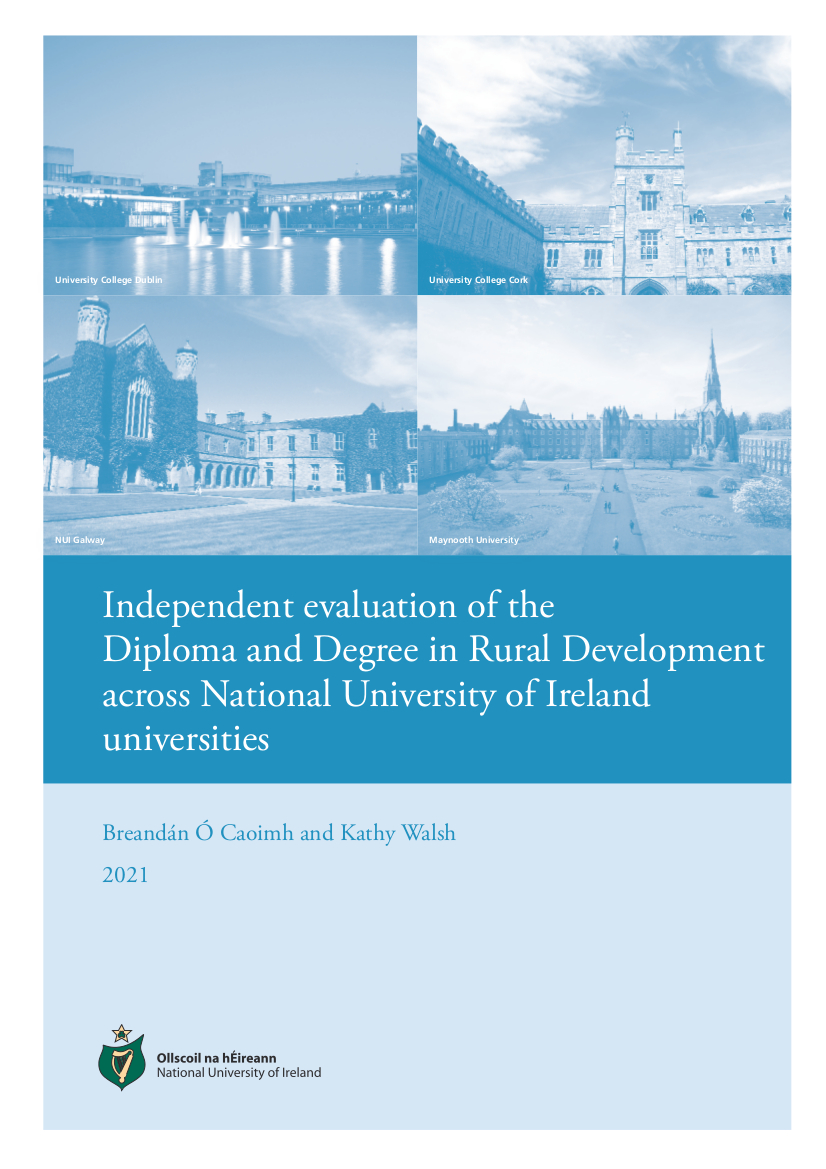
September 2021
This report is authored by Drs Kathy Walsh and Breandán O’Caoimh, and provides a thorough analysis of the nature of the inter-university partnership that underpinned the collaborative BSc and Diploma in Rural Development. All four constituent universities of the NUI were involved in course design and teaching, and the programmes were delivered to part-time, adult learners, through blended learning methods mixing campus attendance with localised delivery via rural development companies and agencies. This report highlights lessons learned from the initiative and recommendations for future inter-university teaching and research collaborations in rural development or other fields of study.
To request a hard copy, please email registrar@nui.ie
The Contribution of Mass Higher Education in Ireland to Public Good: Perceptions from within and outside Irish Universities.
by Ann Averill
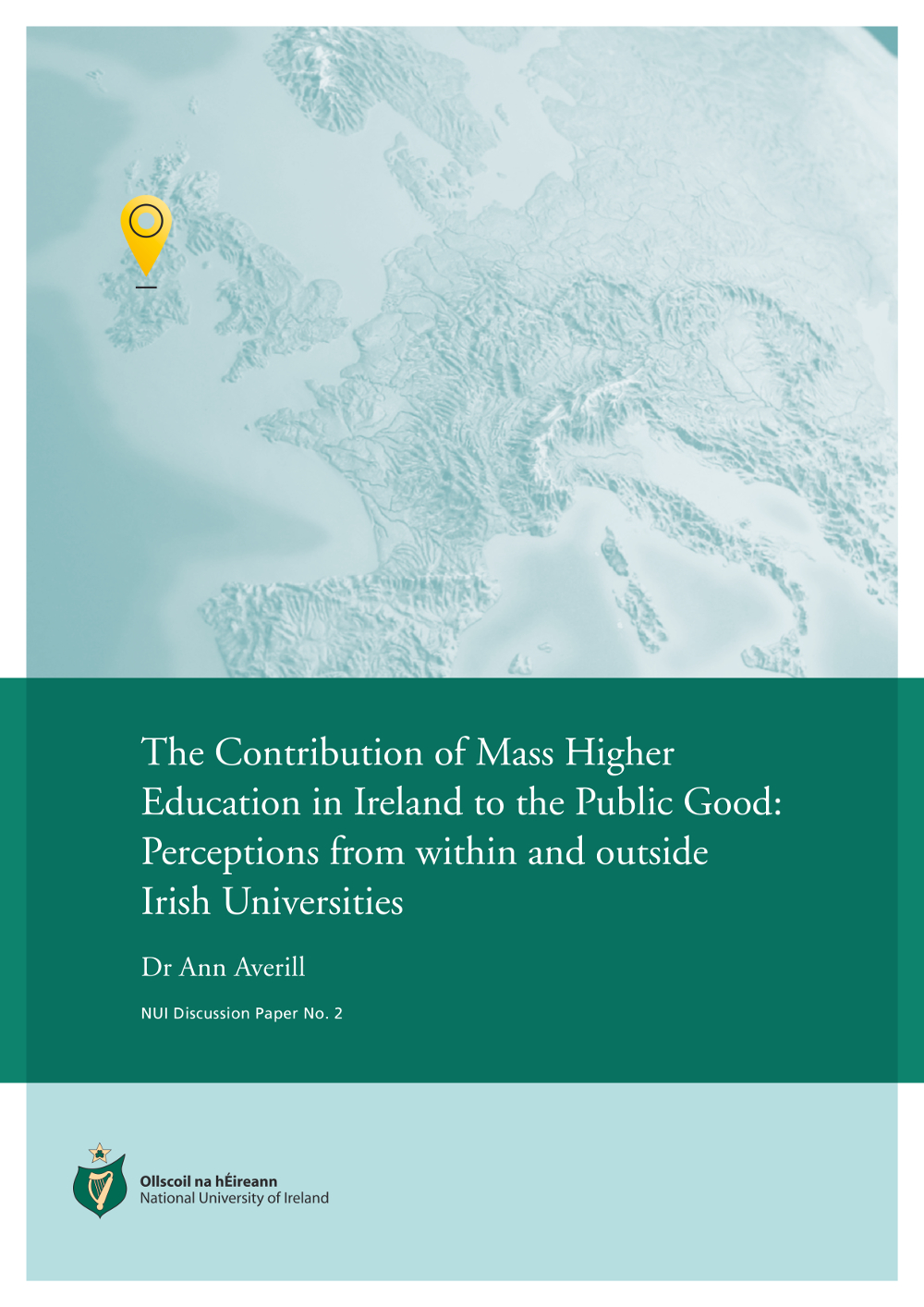 The Contribution of Mass Higher Education in Ireland to Public Good: Perceptions from within and outside Irish Universities is a discussion paper by Dr Ann Averill who was NUI Dr Garret FitzGerald Post-Doctoral Fellow in the Social Sciences from 2018-2020.
The Contribution of Mass Higher Education in Ireland to Public Good: Perceptions from within and outside Irish Universities is a discussion paper by Dr Ann Averill who was NUI Dr Garret FitzGerald Post-Doctoral Fellow in the Social Sciences from 2018-2020.
The aim of the study was to open up enquiry into perceptions of universities’ contribution to the public good in Ireland, as opposed to their undoubted contribution to the economic good. Mass participation rates in Irish higher education form an important context, which was motivated by a concern that economic narratives currently dominate Irish discourses around higher education, eclipsing many outcomes with which university has long been associated. The focus of this study is to explore and examine the perceived non-economic outcomes of mass participation in the traditional university sector.
Discussion is based on qualitative in-depth interviews with a sample of targeted respondents, drawn from two cohorts – one cohort (University) drawn from respondents working in universities in different capacities, and a second (Stakeholder) cohort comprised of personnel in civil society and state bodies as well as students, parents, employers, media, policy-makers, advocacy and community development groups, and representative bodies.
In the study, a distinction arises between the outcomes of higher education in general, and those arising from mass participation higher education where large numbers of graduates collectively influence their communities. Issues were broached with respondents by means of open questions inviting them to elaborate on their perceptions of the aspects of interest to this study. The findings report the perceptions of both cohorts on the contributions of mass higher education to the public good, along five broad dimensions, namely: Public perceptions of mass higher education; Students’ reasons for aspiring to higher education; Society, culture and values; Mass participation, citizenship and political engagement and Funding.
The discussion paper is available to download below.
To request a hard copy, please email publications@nui.ie
Foreign language learning and Ireland’s ‘Languages Connect’ strategy: reflections following a symposium on perspectives for higher education
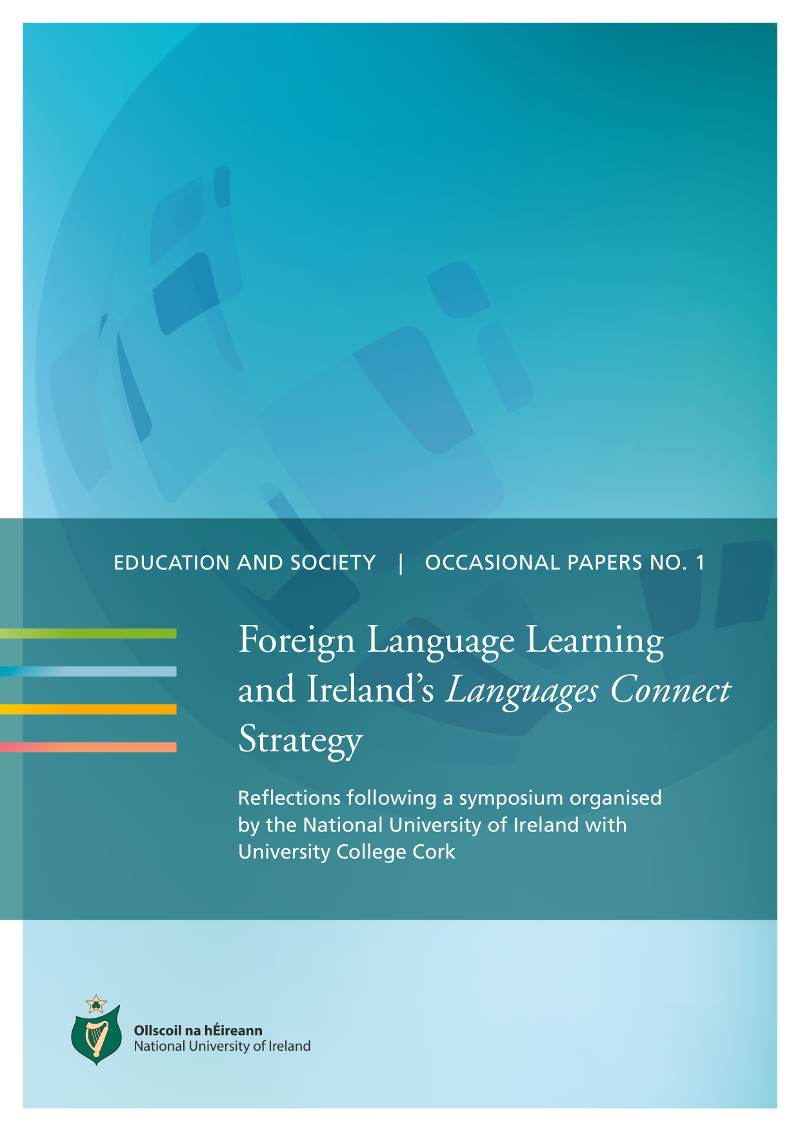 In this publication, a range of contributors from Higher Education provide responses to and perspectives on the challenges posed by Languages Connect: Ireland’s Strategy for Foreign Languages in Education 2017-2026.
In this publication, a range of contributors from Higher Education provide responses to and perspectives on the challenges posed by Languages Connect: Ireland’s Strategy for Foreign Languages in Education 2017-2026.
This publication follows a one-day NUI symposium organised in collaboration with the School of Languages, Literatures and Cultures at University College Cork (UCC) on 27th November 2018.
Contributors include Dr Attracta Halpin, Registrar, NUI; Dr Jenny Bruen, Dublin City University, DCU; Professor Michael Brophy, UCD; Dr Martin Howard, UCC and Professor Leigh Oakes, Queen Mary College, London; Dr Clive Earls, MU; Dr Éamon Ó’Cófaigh, NUI Galway and Professor Mary Gallagher, UCD.
To request a hard copy, please email publications@nui.ie
The Kantian University: Worldwide triumph and growing insecurity
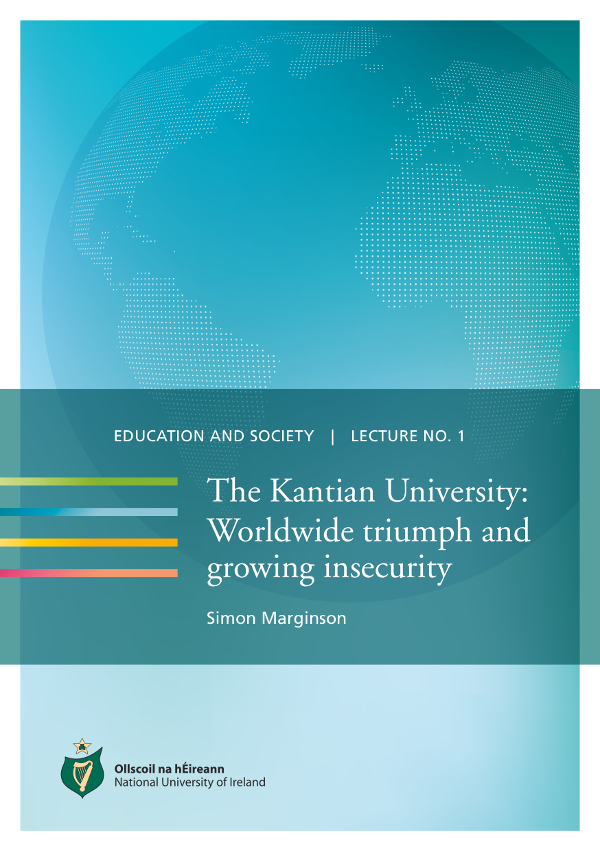 In this paper, Simon Marginson, Professor of International Higher Education at the University of Oxford argues that today’s universities are dealing with insecurities that arise from a desire to be multiversities, delivering on an ever-expanding range of fronts for society. In his view there is a risk of inefficiency in this model, and a concern that the multiversity may lose command of its own destiny as it becomes accountable to a growing number and range of stakeholders.
In this paper, Simon Marginson, Professor of International Higher Education at the University of Oxford argues that today’s universities are dealing with insecurities that arise from a desire to be multiversities, delivering on an ever-expanding range of fronts for society. In his view there is a risk of inefficiency in this model, and a concern that the multiversity may lose command of its own destiny as it becomes accountable to a growing number and range of stakeholders.
To understand the inner motors of universities – what holds them together – Marginson argues that one must go back to the work of German philosophers Kant and Von Humboldt in the eighteenth century and to Cardinal John Henry Newman’s 1852 Idea of a University, a century later. Given the remarkable global spread of universities, Professor Marginson suggests that society must acknowledge them to be one of the most successful and enduring social forms created by humanity. In his view, Newman’s intellectual ideas – formed in Dublin – and Kant’s idea of enlightenment continue to be responsible for shaping universities today.
To request a hard copy, please email publications@nui.ie
The Significance of International Student Mobility in Students’ Strategies at Third Level in Ireland
by Aline Courtois
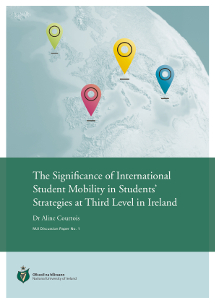 The Significance of International Student Mobility in Students’ Strategies at Third Level in Ireland is a disccusion paper prepared by Dr Aline Courtois who was NUI Dr Garret FitzGerald Post-Doctoral Fellow in the Social Sciences from 2014-2016.
The Significance of International Student Mobility in Students’ Strategies at Third Level in Ireland is a disccusion paper prepared by Dr Aline Courtois who was NUI Dr Garret FitzGerald Post-Doctoral Fellow in the Social Sciences from 2014-2016.
This study examines outgoing student mobility and demonstrates that it brings a number of benefits at individual, institutional, regional and national levels. The majority of students reported having a positive experience with many reporting increased self-confidence, and automy, as well as improved intercultural and interpersonal skills. However, Dr Courtois’s research found that many students reported differing views on the ‘quality’ – particularly the academic quality – of their time spent abroad. There were significant findings on such factors as the levels of institutional support available to outgoing students and also the cost barriers of an additional year abroad as part of a degree programme.
The National University of Ireland held a seminar on 5 December 2017 in the College of Anaesthetists of Ireland to launch the publication.
To request a hard copy, please email publications@nui.ie






















